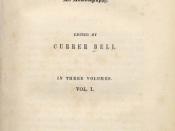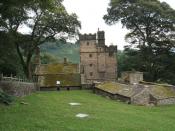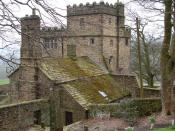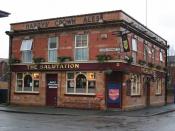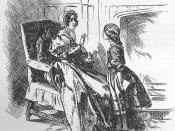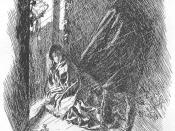AP English/Lit September 28, 2001 The Feminist Side of Charlotte Bronte and Jane Eyre Charlotte Bronte has written an autobiography portraying herself as a feminist, through the character of Jane Eyre. A feminist in the 19th century is a woman who possesses feminine qualities. Feminine qualities such as gentleness, kindness, delicacy, language and proper manners come natural to women to some extent; however to become a true woman of feminine character you must learn from life experiences. There can be no doubt that the first and greatest cause of the book Jane Eyre is to show the events and relationships as copies from real life (Smith 53). Charlotte Bronte's feminist side is developed through major events that took place in her personal life. She shares how she became who she is today, a feminist, through Jane's life experience. The mental pictures are as vivid and bold as though etched by a Rembrandt (Smith 55).
Charlotte has chosen to adhere stern reality (Smith 54).
Starting out at Gateshead, Jane shouts at Mrs. Reed because she has accused Jane of lying. Jane says, "I am not deceitful: if I were I should say I love you; but I declare, I do not love you: I dislike you the worst of anybody in the world except John Reedâ¦Georgiana for it is she who tells lies not I" (Bronte 37). In this passage Jane takes a step towards a more independent thinking female. Jane has endured abuse from Mrs. Reed as well as her children for years. Jane has remained quiet and to herself until this point. As Jane's independent mind rises within her, Jane boldly states not only that she isn't lying, but that she dislikes Mrs. Reed as well. Furthermore, by comparing herself to Georgiana, whom Mrs. Reed considers to be the example of perfection, Jane shows that truth can be found in the strength of defiance verses the lies of conformity. This is Jane's first step to becoming a feminist. She stands up for herself and for what she believes to be true. Later in this same chapter Jane asks "What does Bessie care of me"(Bronte 40). During this event Jane is requiring evidence for her accused crime. Jane usually being quiet and to herself has just established a "taste for the power of speech" (Bodenheimer 157).
After spending some time at Lowood orphanage, Jane takes a job as a governess at a place called Thornfield. At Thornfield, Jane develops a passion and love for Mr. Rochester, the owner. After finally winning his love, Jane and Mr. Rochester become engaged. During the wedding ceremony, as Jane and Mr. Rochester take their vows, a strange man announces that Mr. Rochester is already married to a lady named Bertha Mason. This is humiliating to Jane as a woman. It is not ladylike to be engaged to someone who is currently married. It looks as though Jane and Mr. Rochester are having an affair. Rochester tries to get Jane to become his mistress and move to France. Jane knows that this is wrong and she again uses her power of speech as a woman. She stands up for what she believes is morally right in the eyes of others as well as herself. Jane has now shown a degree of pride as well as independent strength (Moglen 104). By not accepting Rochester's request to move to France, Jane stands up for herself and for her fairness (Kaplan). Jane's desire is to be a lady of character and integrity. That night Jane sneaks away from Thornfield to look for new work. She no longer feels Thornfeild can offer her a future. The man she loves has deceived her. Jane has realized that she must get away and find out how to become this woman of character and integrity.
Jane wanders for nights and days begging for food. She is finally taken in by St. John Rivers. Jane befriends Mary and Diana Rivers, St. John's daughters. Jane begins to learn the life of a lady. It was about time for Jane to discover herself in the image of a woman (Moglen 105). Through her friendship with Mary and Diana, Jane discovers what it takes to be an 1800's feminist. Jane has only some qualities that people would consider feminine. By spending time with Mary and Diana, Jane begins to develop the true character of a woman with gentleness and delicacy. Mary and Diana give Jane their books so she can read and learn new languages. Mary and Diana also teach Jane how to cook and serve. Jane becomes stronger, more confident, and more focused (Moglen 105). Although still considered equal with Mary and Diana Rivers, Jane: Admires and respects their prior learning, and their fine minds. She listens to them talk as she had listened to her former best friends Maria Temple and Helen Burns, just as Charlotte Bronte listened to her best friends Emily and Anne. She also responds to the authority of Diana (Moglen 105).
Jane soon discovers that it is natural to be a feminist. The knowledge and confidence Jane finds in her friendship with Mary and Diana enables her to accept a job from St. John Rivers as a village schoolteacher. This is where Jane begins to overcome her feeling of social humiliation from her previous engagement to the married Mr. Rochester. In her poor and unlearned students, Jane begins to notice a degree of natural politeness and self-respect, which wins her admiration (Moglen 106). Jane then starts to take pride in her accomplishments. By leaving Rochester, Jane has "discovered her own capacities and strengths"( Moglen 106).
During Jane's time spent with the Rivers family, St. John takes a likeness to Jane. He becomes attracted to her and her ways. He admires her courage and misfortune. Knowing her past, St. John Rivers concludes that Jane would make a useful helpmate (Moglen 109). With that in mind St. John Rivers asks for Jane's hand in marriage. He wants her to join him in his missionary as his wife and nothing less. "For Jane the temptation is strong"(Moglen 109). Jane finally decides to refuse St. John's offer after discovering he only wanted to "buy her body with the coin of spirituality"(Moglen 110). Jane, once again, uses her power of speech, pride, and her new feminist courage to deny yet another man. Jane also calls upon her feminist side to declare what she wants from life. She knows that she must make her own choices even when those choices are uncertain and frightful.
Jane soon comes to realize that all she has ever wanted was a marriage with love. In a way, Jane chooses her own destiny instead of letting fate choose it for her. However, Jane's new feminine knowledge has enabled her to make the right choices, therefore, fate may be taking its course within a new woman. If Jane marries St. John, it would mean she would have security but not true love. This is a true characteristic of feminism. Jane has discovered the meaning of life for feminist. Jane wants a man who will love her unconditionally and she in return can love him in the same way. Jane decides to go back and find the man she has always loved. Mr. Rochester is in reality the personification of a true feminist woman's longing (Stephen 57). Jane returns to Thornfield to find her love. Jane finds out that Bertha Mason burned the house. Mr. Rochester moved to Ferndean and was in seclusion. After finding him, Jane and Mr. Rochester reunite and marry. Jane has found her one true love.
Jane is a creation of Charlotte Bronte. Through all the events occurring everywhere from Gateshead to Ferndean, Jane has developed into a feminist lady, therefore portraying Bronte as a feminist as well. Jane Eyre was Charlotte Bronte's first expression of feeling as a feminist (Waring 52). "For it was an outburst, a great surging heart bursting its bounds and finding an outlet for its accumulated passion"(Waring 52).
Feminist should be able to relate with the events in Jane's life or should we say Charlotte Bronte's life, even without experience. Women usually have a little feminism in their blood. Feminist women have that desire to be ladylike and to get married to someone who can give them true love. It comes naturally. Feminist women have some sense of manners and delicacy. Jane Eyre is simply an autobiography and its intention is to present a plain, narrative of a feminist woman's life (Smith 54).
Charlotte Bronte has made a connection between her life and her book. She has recorded her feelings and feminist ways in the novel Jane Eyre. "She has simply given fictitious names and dates to her own experience at school, as a governess, at her home in Brussels"(Stephen 56). Charlotte Bronte has captured the heart of women and men through the simple character of Jane and through the story of her personal experiences and challenges. When Jane speaks the reader is actually really listening to Charlotte Bronte's voice though it is more or less disguised in conformity to dramatic necessity (Stephen 57).
The reader not only experiences the life of a fictional character, but the life of a real person. Charlotte Bronte portrays herself as Jane Eyre, a girl, a woman, and eventually a feminist lady. Jane pursues and finds her inner being and self worth through the trials and challenges that life gives her. "From beginning to the ending of her story, Jane Eyre moves a living consistent soul; from the child we know grow the girl and woman we know, vivid, energetic, passionate, as well as good, conscientious and devoted" (Howells 59).
